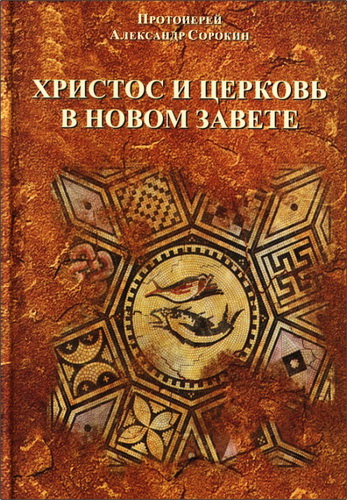
Staniloae Dumitru - The Experience of God - Orthodox Dogmatic Theology
The Orthodox Church makes no separation between natural and supernatural revelation. Natural revelation is known and understood fully in the light of supernatural revelation, or we might say that natural revelation is given and maintained by God continuously through his own divine act which is above nature. That is why Saint Maximos the Confessor does not posit an essential distinction between natural revelation and the supernatural or biblical one. According to him, this latter is only the embodying of the former in historical persons and actions1
This affirmation of Maximos must probably be taken more in the sense that the two revelations are not divorced from one another. Supernatural revelation unfolds and brings forth its fruit within the framework of natural revelation, like a kind of casting of the work of God into bolder relief, a guiding of the physical and historical world toward that goal for which it was created in accordance with a plan laid down from all ages. Supernatural revelation merely restores direction to and provides a more determined support for that inner movement maintained within the world by God through natural revelation. At the beginning, moreover, in that state of the world which was fully normal, natural revelation was not separated from a revelation that was supernatural. Consequently, supernatural revelation places natural revelation itself in a clearer light.
It is possible, however, to speak both of a natural revelation and of a supernatural one, since, within the framework of natural revelation, the work of God is not emphasized in the same way nor is it as evident as it is in supernatural revelation.
Speaking more concretely and in accordance with our faith, the content of natural revelation is the cosmos and man who is endowed with reason, with conscience, and with freedom. But man is not only an object that can be known within this revelation; he is also one who is a subject of the knowledge of revelation. Both man and the cosmos are equally the product of a creative act of God which is above nature, and both are maintained in existence by God through an act of conservation which has, likewise, a supernatural character. To the acts of conserving and leading the world towards its own proper end, there corresponds within the cosmos and within man both a power and a tendency of self-conservation and of right development. From this point of view, man and the cosmos can themselves be taken as a kind of natural revelation.
Dumitru Staniloae - The Experience of God - Orthodox Dogmatic Theology - Vol. 1. Revelation and Knowledge of the Triune God
Translated and edited by Ioan Ionita and Robert Barringer. - Foreword by Kallistos Ware. - Brookline, Massachusetts: HOLY CROSS ORTHODOX PRESS, 1994. – 310 p.
ISBN 0-91765170-7 (pbk.)
Dumitru Staniloae - The Experience of God – Vol. 1 – Contents
Foreword
- Chapter One: Natural Revelation
- Chapter Two: Supernatural Revelation
- Chapter Three: Scripture and Tradition
- Chapter Four: The Church as the Instrument for Preserving Revelation
- Chapter Five: Theology as Ecclesial Service
- Chapter Six: Knowledge of God
- Chapter Seven: The Being of God and His Uncreated Operations
- Chapter Eight: The Super-Essential Attributes of God
- Chapter Nine: The Spiritual Attributes of God
- Chapter Ten: The Holy Trinity: Structure of Supreme Love
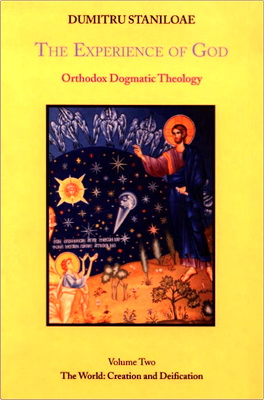 Dumitru Staniloae - The Experience of God - Orthodox Dogmatic Theology - Vol. 2. The World: Creation and Deification
Dumitru Staniloae - The Experience of God - Orthodox Dogmatic Theology - Vol. 2. The World: Creation and Deification
Translated and edited by Ioan Ionita and Robert Barringer. - Preface by Ion Bria. - Brookline, Massachusetts: HOLY CROSS ORTHODOX PRESS, 2000. – 230 p.
ISBN 1-885652-41-0
Dumitru Staniloae - The Experience of God – Vol. 2 – Contents
Preface by Fr. Prof. Ion Bria
1. Creation: the Visible World
- Human Solidarity with Nature
- Creation “ex nihilo” in Time
- The Motive and Goal of Creation
2. The World as Gift and Word
- The Cross on the Gift of the World
- The World: Reasons and Reason
- Human Responsibility Toward the World
3. The Creation of Man
- The Constitution of Man
- Man as God s Special Act of Creation
- The Primordial State
4. The World Unseen: Angels and Human Life
- The Angelic and Human Worlds
- Angelic and Human Knowledge
- The Angelic Hierarchy
5. The World Unseen: Enemies of the Good
- Evil in the Created Order
- The Demons and Human Destiny
6. The Fall
- The Tree of the Knowledge of Good and Evil
- Knowledge of the Good and Human Communion
7. Providence and the Deification of the World
Abbreviations
Notes
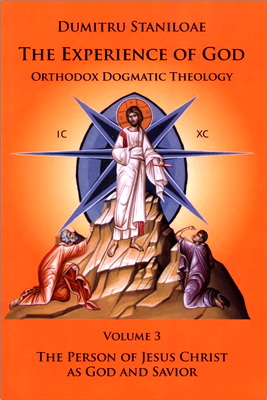 Dumitru Staniloae - The Experience of God - Orthodox Dogmatic Theology - Vol. 3. The Person of Jesus Christ as God and Savior
Dumitru Staniloae - The Experience of God - Orthodox Dogmatic Theology - Vol. 3. The Person of Jesus Christ as God and Savior
Translated and Edited by Ioan Ionita. - Foreword by His Beatitude DANIEL Patriarch of the Romanian Orthodox Church. - Introduction by Andrew Louth. - Brookline, Massachusetts: HOLY CROSS ORTHODOX PRESS, 2011. – 184 p.
ISBN 978-1-9 35317-18-0
Dumitru Staniloae - The Experience of God – Vol. 3 – Contents
Foreword. His Beatitude Patriarch DANIEL of Romania
Introduction. Andrew Louth
- 1. The Word of God in Creation and in the Old Testament
- 2. The Gospel Image of Jesus Christ: God and Man
- 3. The Person of the Incarnate Lord in the Faith of the Church
-
4. The Saving Power of the Incarnate Word
- A. The Kenosis of the Son of God and the Deification of His Human Nature
- B. The Uniqueness of the Virgin Mary, the Theotokos (Mother of God)
- C. The Sinlessness of Christ and His Veneration as God
- 5. The One Work of Salvation: Jesus as Prophet and Teacher
- 6. The One Work of Salvation: Jesus as High Priest and Supreme Sacrifice
-
7. The One Work of Salvation: Jesus as Risen Lord and King
-
A. The Resurrection of Christ
- i. The Reality of Christ’s Resurrection
- ii. The Relationship between the Risen Christ and the Historical Plane
- iii. The Spiritual Irradiation and the Transforming Efficacy of Christ’s Resurrection in the World
- B. The Ascension into I leaven and the Sitting at the Right Hand of the Father
-
A. The Resurrection of Christ
Notes
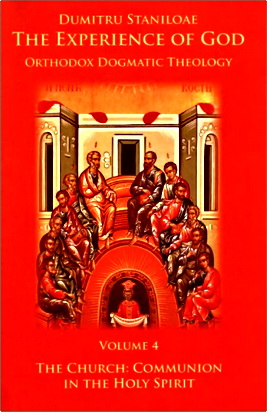 Dumitru Staniloae - The Experience of God - Orthodox Dogmatic Theology - Vol. 4. The Church: Communion in the Holy Spirit
Dumitru Staniloae - The Experience of God - Orthodox Dogmatic Theology - Vol. 4. The Church: Communion in the Holy Spirit
Translated and Edited by Ioan Ionita. - Foreword by Peter C. Bouteneff. - Brookline, Massachusetts: HOLY CROSS ORTHODOX PRESS, 2012. – 189 p.
ISBN 978-1-935317-26-5
Dumitru Staniloae - The Experience of God – Vol. 4 – Contents
Foreword - Peter C. Bouteneff
- 1. The Descent of the Holy Spirit and the Beginning of the Church
-
2. The Theandric Constitution of the Church
- A. The Church as the Mystical Body of Christ, and Christ as Her Head
- B. The Foundation of the Church: God’s Incarnate Son
- C. The Church Imprinted with Christ’s Sacrifice
- D. The Church Pneumatized by the Spirit of the Risen Christ
-
3. Christ’s Threefold Ministry and the Priesthood of the Church
- A. Christ’s Priesthood in the Church
- B. Christ’s Priesthood in the Church through the Universal Priesthood
- C. Christ’s Priesthood in the Church through the Serving Priesthood
- D. The Three Stages of the Priesthood
- E. The Succession of Grace: Christ’s Priestly Work Continued through Other Ministers
- F. The Serving Priesthood’s Role in Maintaining the Unity of the Church
- G. A Detailed Explanation of the Bishop’s and Priest’s Relationship with Christ
- H. The Synodality of the Bishops, and How the Church’s Sobornicity Depends upon It
- I. The Serving Priesthood and the Visible Character of the Church
-
4. Attributes of the Church as the Body of Christ
- A. The Unity of the Church
- B. The Holiness of the Church
- C. The Integral Sobornicity of the Church
- D. The Apostolicity of the Church
-
5. The Working of the Holy Spirit: Divine Grace and Human Freedom
- A. The Working of the Holy Spirit, or Divine Grace
- B. The Human Person’s Free Cooperation with Grace
- C. Gifts as Workings of the Spirit
-
6. The Human Person’s Salvation within the Body of Christ
- A. Righteousness, Justification, Growth, and Ascent in the Spirit
- B. The Human Person’s Rebirth and the Indwelling of Christ
- C. The Gift of Salvation Appropriated through Faith and Good Works
Abbreviations
Notes
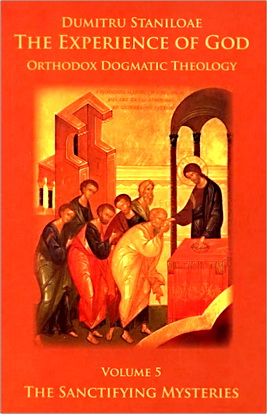 Dumitru Staniloae - The Experience of God - Orthodox Dogmatic Theology - Vol. 5. THE SANCTIFYING MYSTERIES
Dumitru Staniloae - The Experience of God - Orthodox Dogmatic Theology - Vol. 5. THE SANCTIFYING MYSTERIES
Translated and Edited by Ioan Ionita and Robert Barringer. - Foreword by Alkiviadis C. Calivas. - Brookline, Massachusetts: HOLY CROSS ORTHODOX PRESS, 2012. – 233 p.
ISBN 978-1-935317-29-6
Dumitru Staniloae - The Experience of God – Vol. 5 – Contents
Foreword - Alkiviadis C. Calivas
-
1. Christ’s Saving Mysteries: Creation Unified and Made New in the Church
- A. The Sacraments and Creation
-
B. The Christological and Ecclesiological Basis of the Mysteries
- i. Visible and Invisible Operations: The Body, Soul, and Grace of Christ
- ii. Christ, the Unseen Celebrant of the Mysteries
- iii. The Christological and Ecclesial Character of the Mysteries
- iv. The Priest as Visible Celebrant of the Mysteries
-
2. Baptism: The Mystery of Rebirth through Water and the Spirit
- A. The Unity between Water and the Holy Spirit as Womb of the New Man
-
B. The Multiple Efficacy of the Act of Baptism and of the Priest’s Declaration
- i. Baptism as the Death of the Old Man and as Rebirth
- ii. Baptism as the Power of Continuous Spiritual Growth
- iii. Baptism as the Restoration of Christ’s Image in Man
- iv. Baptism as the Gate of Entrance into the Church
- C. The Absolute Necessity of Baptism for Salvation
-
3. Chrismation: “The Seal of the Gift of the Holy Spirit”
- A. The Link between Baptism and Chrismation
- B. The Special Activity of the Holy Spirit in the Mystery of Chrismation
- C. The Meaning of the Visible Act of Chrismation
-
4. The Divine Eucharist: The Mystery of the Lord’s Body and Blood
- A. The Relationship between the Three Mysteries of Initiation
- B. The Real Presence of the Lord’s Body and Blood in the Eucharist
- C. The Presence of the Lord’s Body and Blood in the Eucharist and the Transformation of the Bread and Wine
- D. The Eucharist as Sacrifice and Mystery
- E. The Priest as Celebrant of the Eucharist
-
5. Repentance: The Mystery of Forgiveness
- A. The Institution of the Mystery and Its Practice from the Beginning of the Church
-
B. The Constitutive Elements or Stages of the Mystery
- i. The Confession of Sins and Its Spiritual Value
- ii. The Epitimia (Penances) Recommended by the Priest
- iii. The Absolution Given by the Priest to the Penitent
-
6. Ordination: Priesthood as the Living Image of Christ
- A. The Distinction between Ordination and the Other Mysteries
- B. The Invisible Priesthood of Christ, Source of the Visible Priesthood of the Church
- C. Priesthood and the Unity of the Church
- D. The Institution of the Priesthood; The Three Ranks of Priesthood from the Beginning of the Church
- E. The Spiritual Character of the Christian Liturgical Priesthood and the Priesthood of the Faithful
- F. Apostolic Succession
- G. The Visible Aspects of Ordination and the Invisible Power It Bestows
-
7. Marriage: The Mystery of Human Love Crowned in Glory and Honor
- A. The Place of Marriage among the Other Mysteries
- B. Marriage as a Natural, Lifelong Bond between a Man and a Woman
- C. The Strengthening and Ennobling of Marriage by Christ
- D. The Mystery’s Constitutive Aspects and Their Significance for the Spiritual Power Bestowed by the Mystery
-
8. Holy Unction: The Mystery of Divine Healing
- A. Definition and Main Purpose
- B. Secondary Purpose
Abbreviations
Notes
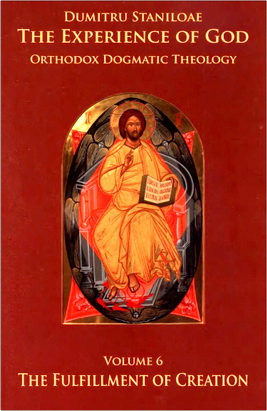 Dumitru Staniloae - The Experience of God - Orthodox Dogmatic Theology - Vol. 6. The Fulfillment of Creation
Dumitru Staniloae - The Experience of God - Orthodox Dogmatic Theology - Vol. 6. The Fulfillment of Creation
Translated and Edited by Ioan Ionita. - Foreword by Metropolitan KALLISTOS (Ware) of Diokleia. - Brookline, Massachusetts: HOLY CROSS ORTHODOX PRESS, 2013. – 258 p.
ISBN 978-1-935317-34-0
Dumitru Staniloae - The Experience of God – Vol. 6 – Contents
Foreword - Metropolitan KALLISTOS (Ware) of Diokleia
- 1. Death as Passage to Life Eternal
- 2. The Immortality of the Soul
- 3. The Individual Judgment and the Possibility of an Eternal Hell
-
4. Christ as Judge and the Witnesses to the Individual Judgment
- A. The Author and Criterion of the Individual Judgment
- B. Witnesses, Accusers, and Defenders at the Individual Judgment
-
5. The Condition of Souls between Death and Resurrection
- A. Departed Believers’ Growth in Communion with God
- B. The Communion of the Righteous
- C. Prayers for the Dead
- D. The Icons and Relics of the Saints
-
6. The End of the Present World
- A. The Movement of Creation toward the End
- B. History and Universal Eschatology
- C. Conjectures about the World’s Final Moments
- D. The Signs and Unseen Cause of the End
- 7. The Coming of Christ and the Image of the World Made New
- 8. The Resurrection of the Body
- 9. Universal Judgment
- 10. The Life Eternal
Abbreviations
Notes
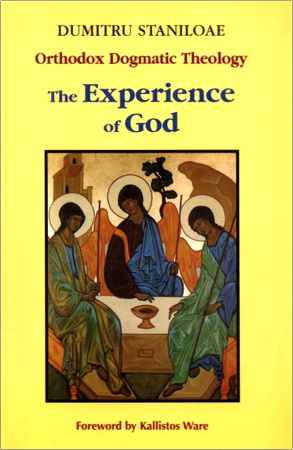
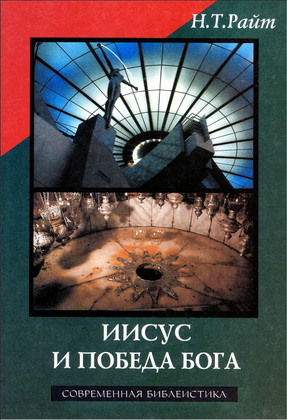
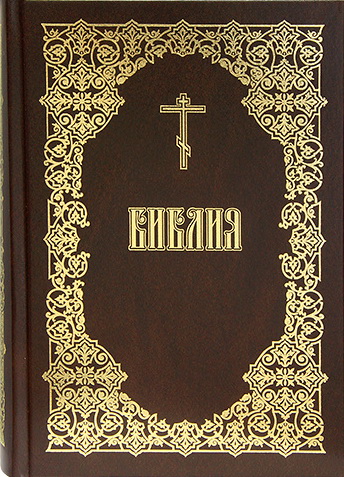
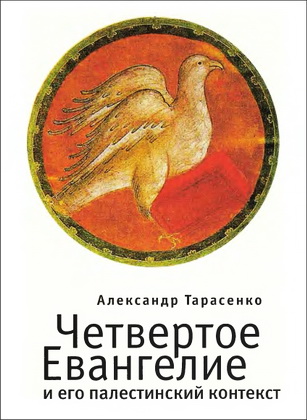
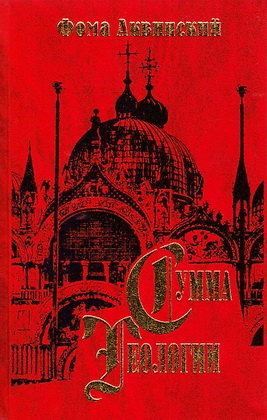
Комментарии (2 комментария)
Ограмное спасибо за эти 6 томов!
Ограмное спасибо за первые три тома!
Но планируется ли продолжение, остальные три тома?